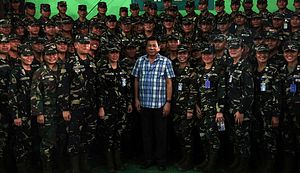Later this month, the Philippines will get a new military chief following the retirement of the current head of the Armed Forces of the Philippines (AFP) Eduardo Ano. The change, the latest in a series of ongoing appointments and promotions under President Rodrigo Duterte over the past few months, comes at a critical time as the Southeast Asian state faces a number of key security challenges and questions around the future shape of its ongoing defense modernization.
As I have noted before, the AFP has been preoccupied with a range of issues over the past few months, including the rising threat of the Islamic State (IS), made clear by the siege by IS-linked militants in May, ongoing domestic insurgencies, and broader questions raised over both the future direction of the country’s military modernization as well as civil-military relations under a strongman president (See: “Battle for Marawi Deepens Philippines’ Military Budget Challenge”).
Amid this, there have been a few changes in defense portfolios over the past months, along with planned promotions among some high-level officials. In terms of appointments, though there have been others, among the most closely watched has been that of Philippine Army Chief. On October 5, following a change of command ceremony, Major General Rolando Bautista assumed the post as expected (See: “Who is the Philippines’ New Army Chief?”). He replaced Glorioso Miranda, from the Philippine Military Academy (PMA) class of 1983 who was appointed by Duterte to the board of the Bases Conversion Development Authority after reaching the mandatory retirement age of 56.
In his assumption speech, Bautista suggested that changes would have to be made within the AFP, including in intelligence operations, to confront what he said was a “new type of conflict,” focused in densely populated urban areas (as opposed to the jungle warfare the AFP is more accustomed to) and powered by social media(See: “Why Has the Philippines’ Military Struggled in its Terror Fight Against Duterte?”). Other Philippine defense officials, including Defense Secretary Delfin Lorenzana, have also similarly suggested that operational, strategic, and doctrinal changes may be necessary (See: “Battle for Marawi Exposes Philippines’ Military Intelligence Crisis”).
On October 26, in the most senior level change within the AFP, Philippine military chief Eduardo Ano, a classmate of Miranda’s from the PMA class of 1983, will also retire in accordance with the mandatory age requirement. Ano’s retirement was expected in line with that requirement and amid Duterte’s indication that he would be asked to serve in other government posts subsequently as well. Ano expressed publicly last month his view that has been expressed by others as well that the mandatory retirement age of 56 – lower than that of other countries – had deprived the Philippines of officials of greater experience.
In terms of Ano’s replacement, publicly, Philippine defense officials said earlier this week that four three-star generals would be the candidates vying for the post: Western Command chief Lt. General Carlito Galvez; Eastern Mindanao Command Chief Lt. Gen. Leonardo Rey Guerrero; Lt. Gen. Melchor Mison Jr.; and Deputy Chief of Staff Vice Admiral Narciso Vingson Jr.
Of the four, two are from the Army (Guerrero and Galvez), one is from the Air Force (Mison), and one is from the Navy (Vingson). The post of military chief, not unlike some other neighboring Southeast Asian states, has tended to be dominated by the Army. Two of four candidates are from the PMA Class of 1984 (Guerrero and Mison), while the remaining two are from the PMA Class of 1985 (Galvez and Vingson).
Irrespective of who replaces Ano in the next few weeks, they will no doubt have a full plate of issues to deal with and will have an important role to play in the country’s military modernization moving forward.































